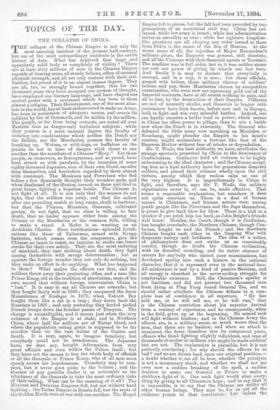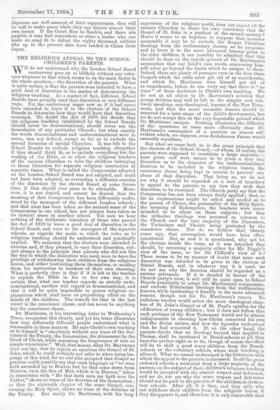TOPICS OF THE DAY.
THE COLLAPSE OF CHINA.
rilHE collapse of the Chinese Empire is not only the most amazing incident of the present half-century, but one of the most extraordinary incidents in the entire history of Asia. What has deprived that huge and apparently solid body so completely of virility ? There are at least sixty millions of men in the Chinese Empire capable of bearing arms, all sturdy fellows, often of unusual physical strength, and all not only content with their civi- lisation, but proud of it to an almost insane degree. They are all, too, so strongly bound together, that for two thousand years they have accepted one system of thought, have employed one literary language, and have obeyed one central power with a reverence which has been to them almost a religion. Their Government, one of the most abso- lute in the world, has at least endeavoured to make an Army, has been in possession of adequate means, and counts its soldiers by ten of thousands, and its militia by the million. The people, so far from being cowards, are noted all over Eastern Asia as dangerously turbulent subjects ; while they possess in a most unusual degree the faculty of entering into combinations which neither the Dutch nor the British, nor the Mandarins, possess the faculty of breaking up. Wolves, or wild-dogs, or buffaloes on the prairie do not in time of danger stick closer to one another than the members of a Chinese" Hoey." Yet these people, so numerous, so homogeneous, and so proud, have been struck as with paralysis, by the incursion of some eighty thousand Japanese, men of their own blood, smaller than themselves, and heretofore regarded by them almost with contempt. The Mexicans and Peruvians who fled before a few Spaniards thought their invaders gods, and when disabused of the illusion, turned on them and died in great heaps, fighting a hopeless battle. The Chinese do not fight at all. It is not only that the masses do not fight, that the soldiers run away, and that the sailors after one pounding match at long range, skulk in harbour; but that the Princes, Ministers, Generals, cultivated gentry, do not fight, that no class is willing to face death, that no leader appears either from among the Princes or the Mandarins or the common folk, willing to make a stand. A Hofer is as wanting as an Archduke Charles. Even fortifications—splendid fortifi- cations like those of Talienwan, armed with Krupp batteries, which amaze even the conquerors, give the Chinese no heart to resist, no impulse to strike one brave stroke for their own safety. They are the most enduring of mankind, they care nothing about death, they fight among themselves with savage determination ; but as against the foreign invader they not only do nothing, but they make no effort to do anything. What has happened to them What makes the officers run first, and the soldiers throw away their protecting rifles, and a man like Prince Kung, old in the tradition of absolutism, state of his own accord that without foreign intervention China is "lost." It is easy to say all Chinese are cowards ; but they fought fairly well in 1860; they conquered the fierce Mussulmans of Kashgar in 1879, when Yakoob Bey fought them like a rat in a trap ; they drove back the Russians in 1881; and only yesterday they hurled picked French troops down the frontier passes of Tonquin. The change is unintelligible, and it occurs just when the very existence of the Empire is at stake, and in Northern China, where half the soldiers are of Tartar blood, and where the population eating grain is supposed to be far sturdier than on the vast deltas of the Centre and South. It is easy, again, to imagine treachery, but everybody could not be treacherous. The Japanese have, we dare say, bought information from very great officials and even within the Palace itself ; but they have not the means to buy the whole body of officials or all the Generals or Prince Kung, who of all men most openly avows his hopelessness. Treachery may be ram- pant, but it never goes quite to the bottom ; and the absence of any guerilla leader is as noticeable as the reluctance of the Generals to take the most ordinary risks of their calling. What can be the meaning of it all ? The Mexican and Peruvian Empires fell, but not without hard fighting ; the Tartar Empire in Russia fell, but the septa of the Golden Horde were at war with one another. The Mogul Empire fell to pieces, but the fall had been preceded by two generations of an anarchical civil war. China has col- lapsed, while her army is intact ; while her administration moves as smoothly as ever ; while her eighteen kingdom- like provinces are all obeying any order issued to them from Pekin in the name of the Son of Heaven. At the worst scene of all, the rejection of Major Hannecken'a military plans, the Emperor was present, still absolute, and all the Viceroys with their financial agents or Taoutais. The machine was in full order, but in it was neither steam nor coal nor power of giving its wheels one last turn. And finally it is easy to declare that everybody is corrupt, and in a way, it is true ; but these officials, gorged with bribes, these military thieves of soldiers' rations and pay, these Mandarins chosen by competitive examination, who even now are squeezing gold out of the Imperial contracts, have at all events nothing to gain, and all to lose, by the destruction of their Empire. Pilferers are not of necessity skulks, and Generals in league with contractors have been known, before now and in Europe, both to fight and win very splendid battles. Indeed, one can hardly conceive a better road to power, which means in China too often power to pillage, than to win a battle now when the Court is in extremity. The General who defeated the little army now marching on Moukden or Neuchang, might plunder the Empire to his heart's. content, might accumulate a, fortune like that of the Empress Mother without fear of rebuke or degradation. Sir. T. Wade, the best authority we have, attributes the strange spectacle presented by China to the dominance of Confucianism. Confucius held, all violence to be highly unbecoming to the ideal character ; and the Chinese accept- ing him as a final authority have for generations despised soldiers, and placed their reliance wholly upon the civil virtues, among which they reckon calm as one of the very highest. It is ungentlemanly in China to fight, and therefore, says Sir T. Wade, the military organisation never is, or can be, made effective. That seems a reasonable explanation, but somehow it does not quite convince us. There is a deal of human nature in Chinamen, and. human nature even among gentle people like the Peruvians and the Japs themselves, is prone to give back blow for blow. There is a kick in a Quaker if you prick him too hard, as John Bright's friends well knew. Besides, the Court, though it is Confucian, has bought ironclads ; the Northern Chinese, though Con-, fuciati, fought us and the French ; and the Southern Chinese fought each other in the Taeping War with desperate energy and boldness. The idea of a nation of philosophers does not strike us as conceivably correct, though no doubt the Chinese civilisation, with its dreadful crowding, and its entire absence of careers for anybody who cannot pass examinations, has developed apathy into such a feature in the national character, that it is expressed even in the national face. All misfortune is met by a kind of passive Stoicism, and all energy is absorbed in the never-ending struggle for comfortable existence. Still, the Chinama,n's apathy is not limitless, and aid not prevent two thousand men from dying at Ping Yang round General Tso, and we should rather attribute the Chinese defeats to a com- plete loss of confidence in all superiors. "He has sold me, or he will sell me, or he will run," that is the Chinese conviction about his superior derived from a century of experience, and he consequently, when in the field, gives up at the beginning. NO armed mob will fight without leaders ; and in the Chinese Army the officers are, in a military sense, so much worse than the men, that there are no leaders ; and when an attack is imminent, the force dissolves into its component parts, officers who think fighting slightly ridiculous, and tens of thousands of coolies in uniform who might be made soldiers1 but are not. ' The explanation is plausible, but it is not perfectly convincing ; for why should the officers be so bad? and we are driven back upon our original position,— a doubt whether it can all be true, whether the paralysis is not a momentary shock, and whether we shall not see even now a sudden breaking of the spell, a sudden decision in some One General or Prince to make a stubborn fight of it. One such fight would alter every- thing by giving to all Chinamen hope ; and to say that it is impossible, is to say that the Chinese are unlike all other human beings. They may -be, for as yet all tb e evidence points to that conclusion; but unless the Japanese are well assured of their separateness, they will do well to make peace while they can dictate almost their own terms. If the Court flies to Nankin, and there sits passive, it may find somewhere or other a leader who can make an army fit to defeat the eighty thousand soldiers who up to the present date have landed in China from Japan.



















































 Previous page
Previous page